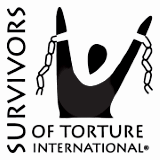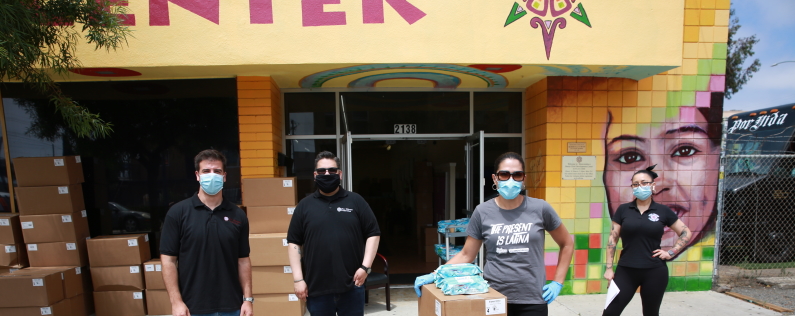
The Chicano Federation has been providing social services assistance to San Diegans in need since 1969. However, over the past several years, new leadership has helped revitalize the Chicano Federation’s role within the communities it serves.
Leading that change has been Nancy Maldonado, who was hired in 2017 as the Chicano Federation’s Senior Program Director. The fresh ideas and perspective she brought to the organization allowed her to quickly rise to the position of CEO.
Under her guidance, the Chicano Federation has emphasized creating self-sufficiency and intergenerational wealth within the communities the organization serves, as well as improving childhood education and the physical and mental health of these communities’ members.
With a Master’s Degree in Exercise Science and a Bachelor’s Degree in Kinesiology, Maldonado saw an opportunity to combine her background in health and wellness with the programs the Chicano Federation offers.
“When the opportunity at Chicano Federation was presented to me, I thought, ‘Here is an organization that’s working in affordable housing, subsidized childcare, early childhood education; this is an opportunity to really address all the different components,’ and then start to bring in that health and wellness once people have stable jobs and have affordable childcare and they know that their children are eating healthy,” said Maldonado.
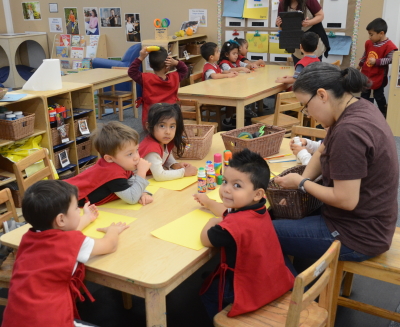
The Chicano Federation has four core programs operating under Maldonado’s direction—Child Development, Child Nutrition, Housing and Workforce & Business Development.
The Child Development Program serves clients with young children who normally may not have access to quality childhood education. This program is unique in that the Chicano Federation has ensured low-cost education as a service by running their own school.
Known as the Barrio Logan Child Development Center, the school serves children ages 3-5. A synopsis of the school’s purpose, found on the organization’s website, notes that the school “is committed to fostering physical, cognitive, emotional and social development by developing and providing high quality child development services that offer an enriching and nurturing educational environment.”
The Chicano Federation has also taken on a leadership role within San Diego’s disadvantaged communities by providing affordable, low-income apartment complexes through their Housing Program. The organization manages these properties itself.
The organization has also worked to empower women from diverse and economically-challenged backgrounds through its Workforce & Business Development Program, which trains women to start their own home-based childcare businesses.
Although the Chicano Federation was initially created to serve San Diego’s Chicano and Latino populations, the CF programs also serve large numbers of African Americans, Middle Easterners, Asians, Pacific Islanders, Native Americans and Caucasians.
Maldonado said that since she has been with the Chicano Federation, she has seen the organization touch the lives of at least 10,000 families each year.
Maldonado believes that governmental and communal systems—such as housing availability, food security, childcare, education and wealth distribution—have damaged the communities the organization serves via discriminatory policies that shaped those systems. She acknowledged that, despite the Chicano Federation’s successes, many of the issues the organization is fighting back against today are the same issues it was fighting when the organization was founded in 1969.
“Our goal, obviously, is for no family in San Diego to have to utilize our programs,” Maldonado said. “If we could run ourselves out of business, that would be a dream come true.”
The Chicano Federation’s long-term goal is for its clients to achieve a level of sustained success and stability, so that eventually they can thrive independent of the organization’s programs.
“We think about how to break the cycle of poverty and how to help our families advance,” Maldonado said. “It’s two-fold. It’s starting at the most formative years, which is zero to five. But it’s also building wealth within our community, to help our communities to advance.”
Maldonado said the purpose of the Housing and Workforce & Business Development Programs is to begin the process of creating intergenerational wealth that has traditionally eluded impoverished racial and ethnic minority communities in San Diego. This requires not only creating short-term opportunities for housing and employment but also instilling, within clients, a long-term affinity for ownership and entrepreneurship.
One other major facet of the Chicano Federation’s work is advocacy. The organization advocates for the recognition of basic human rights for clients, as those rights relate to its different programs. However, a unique aspect of the organization’s advocacy work is in its urgent call to get the various communities they serve to be politically active through voting, especially among the local Latino population.
Important to increasing the organization’s role in local voter advocacy in recent years have been the efforts of Roberto Alcantar, Chief Strategy Officer at the Chicano Federation.
“Part of our goal and what we love to see is to really engage the Latino community and have the Latino community be that actively engaged voter block that it should be,” said Alcantar.
According to the United States Census Bureau’s most-recent statistics, Hispanics or Latinos account for 34.1% of San Diego County’s population. But despite being the second-largest racial group in the County, Alcantar said the voter engagement percentage amongst Latinos continues to be the lowest of any racial or ethnic community in the County. Alcantar said that needs to change and that increased voter participation amongst Latinos would create more accurate political representation of the County’s voice and needs.
“Part of what we want to do is be that organization that really drives that change but also is leading the way on advocating for the issues that really affect our community and, essentially, us being able to use that power for real community change,” Alcantar said.
Like Maldonado, Alcantar’s presence at the Chicano Federation is representative of the organization’s revitalized, refocused leadership role amongst San Diego’s disadvantaged communities. In fact, Maldonado herself was a big reason that Alcantar decided to come aboard.
“I saw there was an opportunity for a job at the Chicano Federation, working alongside Nancy. I was really impressed with her vision and where she wanted to take this organization,” Alcantar said.
Prior to joining the Chicano Federation, Alcantar worked in both non-profit and government sectors, doing advocacy and policy work with organizations such as the California State Senate, San Diego City Council and the ACLU.
“I figured that I could really help contribute to [the Chicano Federation], having been someone that worked internally in government and helped pass legislation, as someone who could help bring that angle to it and really help build some coalitions and really make this organization very powerful,” he said.
But Alcantar, who joined the Chicano Federation in 2019 and initially worked as Senior Director, had other, more personal reasons fore joining the organization.
“I grew up in San Ysidro, right by the border with a single mom, so we relied on some of the programs that Chicano Federation offered at that time,” he said. “That left a big impression on me of having this organization where people spoke like me, looked like me.”
His prior appreciation for the Chicano Federation gave him further incentive to join an organization where he would do the same work for others that what was once done for him.
Of his decision to ultimately join the Chicano Federation, Alcantar said, “It was about giving back and being somewhere that had a huge impact on my life and my family and being able to...create more opportunities for our community.”
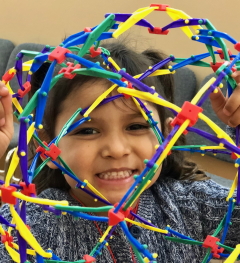
This infusion of new leadership at the Chicano Federation, spearheaded by Maldonado and Alcantar, has been very effective at helping the organization meet its goals. According to the Chicano Federation’s website, the two have specifically worked together on “developing, communicating, executing and sustaining strategic initiatives” that aim to both further the improvement of the organization’s programs and continue to advocate for change and fairness for their clients.
This year, due to the COVID-19 pandemic, Maldonado and Alcantar have had to do more strategic maneuvering for the organization than they may have ever thought possible.
Maldonado said that, at the beginning of the pandemic, the Chicano Federation was required to operate remotely due to State-ordered business shutdowns in March. However, after a short time the organization was allowed to return to an in-person work environment because of their status as an essential business.
“Our team was really eager to get back and to start serving people because we understand that this is the time where people need us the most,” Maldonado said. “It was really important for us to be physically present during this time and to offer our community a space where they could come and get answers.”
In order to ensure the health and safety of both Chicano Federation employees and clients, the organization rented an additional office space to work out of during the pandemic so that clients could address their questions, concerns or needs as safely as possible.
Although the organization has been able to maintain vital services to the community during the pandemic, they have had to re-calibrate some of their ongoing programs.
One major limitation is that Chicano Federation employees are currently not allowed to visit clients’ homes to monitor their welfare. Under normal circumstances, routine in-home visits are an important aspect of the Housing Program.
“That’s been kind of a ripple effect because part of what we do when we go into homes is we’re checking for the health and safety of children, and we’re checking to make sure that children are taken care of, that they’re meeting their developmental milestones,” Maldonado said. “We’re doing virtual visits for education, we’re doing virtual checks, but it’s just not quite the same as having someone be there and be physically present.”
The Federation’s preschool program has also been negatively affected by Covid-19. For a time, the Barrio Logan Child Development Center had to be closed. Though the preschool reopened in July, making sure that children, parents and teachers are safe is still a major concern.
“Our staff is in the same exact situation as a lot of the folks that we’re wanting to help right now,” Maldonado said. “It’s a very delicate balance and it’ll continue to be so.”
Despite a number of challenges, the Chicano Federation has largely been able to withstand the impact of COVID-19. However, many of its clients have struggled during this strange and difficult time.
“We have families who are having to choose right now between their children’s safety or putting food on the table,” Maldonado said of clients who have to work jobs in high-risk industries in order to provide for their loved ones. “What kind of a choice is that?”
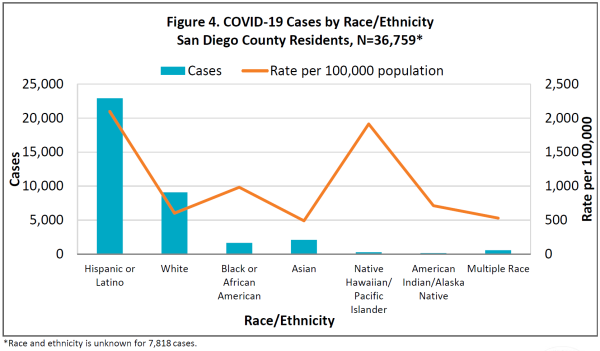
County of San Diego - Data through 9/19/20
Maldonado said that, in San Diego, Latinos in particular have been disproportionately affected by COVID-19. Latinos have shown higher rates of infection and death, as well as loss of employment, compared to rates within the same categories among other racial and ethnic groups during the pandemic.
“At first, it was infuriating to hear people call it ‘the equalizer,’” Maldonado said of COVID-19 and the theory that the virus would somehow even things out on a socioeconomic level. “It is absolutely not the equalizer. If anything, it’s just causing this divide to get larger...Your life has either been devastated by this pandemic, or you haven’t been affected at all.”
Alcantar added to this, explaining that the pandemic has exposed the numerous hardships minority groups have had to endure due to flawed designs in governmental and social systems.
“The reason why we’re seeing such a disproportionate impact on the families that we serve is because of the systematic failures that have put our families in that position,” he said. “Our families have had to adapt to these conditions of lack of affordable housing that forces them to have to share one room with multiple families, the lack of [intergenerational] wealth that forces families to have to work in these essential, high-contact, high-risk, low-paying jobs.”
Alcantar indicated that the country as a whole was not prepared to combat a pandemic and that minority communities across the U.S. are now paying the price. In turn, Maldonado made sure to note that the effects of the past six months on those communities simply won’t go away as soon as a vaccine is available.
“Part of the problem is, I think, that the impacts of this are going to last a lot longer than a lot of people realize,” she said.
Maldonado has begun to plan ahead in order to “anticipate what [clients’] needs are going to be” over the course of the next six months to a year, at least. Her hope is that by getting out in front of this planning stage, the Chicano Federation can contribute to a reduced recovery time for its clients.
Maldonado also said that watching the Chicano Federation’s clients deal with the added hardship of the pandemic has been frustrating. Though she called the communities the organization serves “amazingly resilient,” she wished they had the luxury of not needing to be resilient so often.
“We will figure out a way to survive, but we shouldn’t have to be resilient,” she said. “Our families shouldn’t have to be working multiple jobs to survive. They shouldn’t have to be living with relatives to be able to have a roof over their head.”
Additionally, Alcantar has been working on implementing advocacy strategies to create long-lasting change within these various systems that have failed San Diego’s minority communities.
Despite the added challenges created by the pandemic and its residual effects on the organization’s clientele, Maldonado and Alcantar remain optimistic about the organization’s ability to have a positive impact on the communities they serve during this time.
“We’ve had some staff who have been very innovative in finding ways to continue to serve families,” Alcantar said.
Some of the ways Chicano Federation staff members have been able to help clients have been by locating online curricula and other scholastic activities for young students, dropping off school supplies so parents can help kids stay up to date on schoolwork, as well as delivering medical and cleaning supplies.
“It’s just been inspiring to see how dedicated some of the folks on our team are,” Alcantar said. “We haven’t taken one approach to the pandemic. We’ve been really good at finding multiple ways to help out.”
Because information about the pandemic is constantly changing, it is imperative that the Chicano Federation continues to be a beacon of stability for people whose lives have been destabilized by COVID-19.
“We all have to just be really flexible and, I think, offer a level of grace and understanding across the board,” Maldonado said.
Though the pandemic may have highlighted a need for the Chicano Federation to exude these traits more than ever, that doesn’t mean acting with grace and understanding towards clients is new for the organization.
“When we’re working with folks who have been so used to being turned down...we really have to go the extra mile to assure them that we’re here to assist them and that we’re not going to turn our backs on them,” Maldonado said.
If the pandemic has proven anything about the Chicano Federation, it’s that its leaders and employees have gone more than the extra mile and have no intention of turning their backs on those they serve.
For 51 years, the Chicano Federation has been there for San Diego’s most disadvantaged populations again and again, when not many other people or organizations have been. It has continued to be there for those communities during the pandemic. It is a safe bet that it will be there beyond the pandemic as well.










